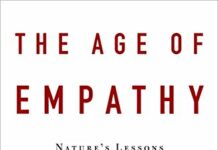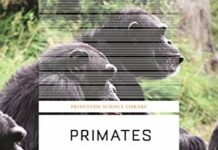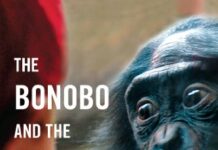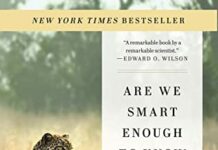
Ebook Info
- Published: 2019
- Number of pages: 336 pages
- Format: PDF
- File Size: 19.16 MB
- Authors: Frans de Waal
Description
A New York Times Bestseller and winner of the PEN / E. O. Wilson Literary Science Writing Award Primatologist Frans de Waal explores the fascinating world of animal and human emotions.Frans de Waal has spent four decades at the forefront of animal research. Following up on the best-selling Are We Smart Enough to Know How Smart Animals Are?, which investigated animal intelligence, Mama’s Last Hug delivers a fascinating exploration of the rich emotional lives of animals.Mama’s Last Hug begins with the death of Mama, a chimpanzee matriarch who formed a deep bond with biologist Jan van Hooff. When Mama was dying, van Hooff took the unusual step of visiting her in her night cage for a last hug. Their goodbyes were filmed and went viral. Millions of people were deeply moved by the way Mama embraced the professor, welcoming him with a big smile while reassuring him by patting his neck, in a gesture often considered typically human but that is in fact common to all primates. This story and others like it form the core of de Waal’s argument, showing that humans are not the only species with the capacity for love, hate, fear, shame, guilt, joy, disgust, and empathy.De Waal discusses facial expressions, the emotions behind human politics, the illusion of free will, animal sentience, and, of course, Mama’s life and death. The message is one of continuity between us and other species, such as the radical proposal that emotions are like organs: we don’t have a single organ that other animals don’t have, and the same is true for our emotions. Mama’s Last Hug opens our hearts and minds to the many ways in which humans and other animals are connected, transforming how we view the living world around us. 16 pages of black and white illustrations
User’s Reviews
Editorial Reviews: Review “Through colorful stories and riveting prose, de Waal firmly puts to rest the stubborn notion that humans alone in the animal kingdom experience a broad array of emotions….De Waal contributes immensely to an ethical sea change for animals.” ― Barbara J. King, NPR”De Waal’s eye-opening observations argue for better treatment and greater appreciation of animals, even as he ensures that you’ll never look at them―or yourself―the same way again.” ― People”Game-changing….For too long, emotion has been cognitive researchers’ third rail….But nothing could be more essential to understanding how people and animals behave. By examining emotions in both, this book puts these most vivid of mental experiences in evolutionary context, revealing how their richness, power and utility stretch across species and back into deep time….The book succeeds most brilliantly in the stories de Waal relates.” ― Sy Montgomery, The New York Times Book Review”An original thinker, [de Waal] seems to invite us to his front-row seats, sharing the popcorn as he gets us up to speed on the plot of how life works, through deeply affecting stories of primates and other animals, all dramas with great lessons for our own species.” ― Vicki Constantine Croke, Boston Globe”De Waal’s conversational writing is at times moving, often funny and almost always eye-opening….It’s hard to walk away from Mama’s Last Hug without a deeper understanding of our fellow animals and our own emotions.” ― Erin Wayman, Science News”A captivating and big-hearted book, full of compassion and brimming with insights about the lives of animals, including human ones.” ― Yuval Noah Harari, New York Times best-selling author of Sapiens: A Brief History of Humankind”Before I realized Frans de Waal’s connection to Mama’s actual last hug, I sent the online video link to a large group of scientists saying, ‘I believe it is possible to view this interaction and be changed forever.’ Likewise, I believe that anyone reading this book will be changed forever. De Waal has spent so many decades watching intently and thinking deeply that he sees a planet that is deeper and more beautiful than almost anyone realizes. In these pages, you can acquire and share his beautiful, shockingly insightful view of life on Earth.” ― Carl Safina, author of Beyond Words: What Animals Think and Feel”I doubt that I’ve ever read a book as good as Mama’s Last Hug, because it presents in irrefutable scientific detail the very important fact that animals do have these emotions as well as the other mental features we once attributed only to people. Not only is the book exceedingly important, it’s also fun to read, a real page-turner. I can’t say enough good things about it except it’s utterly splendid.” ― Elizabeth Marshall Thomas”Frans de Waal is one of the most influential primatologists to ever walk the earth, changing the way we think of human nature by exploring its continuity with other species. He does this again in the wonderful Mama’s Last Hug, an examination of the continuum between emotion in humans and other animals. This subject is rife with groundless speculation, ideology, and badly misplaced folk intuition, and de Waal ably navigates it with deep insight, showing the ways in which our emotional lives are shared with other primates. This is an important book, wise and accessible.” ― Robert Sapolsky, author of Behave: The Biology of Humans at Our Best and Worst”In Mama’s Last Hug, Frans de Waal marshals his wealth of knowledge and experience, toggling expertly between rigorous science and captivating anecdote to explain animal behavior―humans included. While doing so, he rebukes the common conceit that we are necessarily better, or smarter, than our closest relatives.” ― Jonathan Balcombe, author of What a Fish Knows About the Author Frans de Waal, author of Mama’s Last Hug, is C. H. Candler Professor Emeritus of Primate Behavior at Emory University and the former director of the Living Links Center at the Yerkes National Primate Research Center. He lives in Atlanta, Georgia.
Reviews from Amazon users which were colected at the time this book was published on the website:
⭐‘Mama’s Last Hug’ begins with Mr. de Waal describing the reconciliation of two chimps after a fight. The custom involves them getting into a sixty-nine position, cleaning each other’s butts, then turning around and grooming each other’s faces. Not only did the unsanitary ritual grab my undivided attention, it also made me think that if there’s such a thing as reincarnation, becoming a chimp would not be my first choice. While the author comes across as quite gentle, his book quickly sets the tone that he will be describing the good, the bad, and the ugly in the animal kingdom and how it mirrors humanity. Get ready. As the author states, chimpanzee society is not for the meek and weak.The book describes many of the emotional similarities between humans and other animals. The primary focus is primates such as chimpanzees and bonobos. Mr. de Waal has a long career as an animal behaviorist whose observations are rooted in scientific observation and evolution. He challenges many of the more outmoded attitudes by people and scientists about humans being unique as compared to the other animals on our planet. The author repeatedly argues against the belief that animals are “dumb automatons devoid of feelings and awareness.” It is full of experiments done with primates and other animals that are described and summarized in easy-to-understand writing to back his argument. ‘Mama’s Last Hug’ also covers such topics as the difference between emotions and feelings; the history of man’s low opinion of animals as sentient beings; social hierarchy and using power; building coalitions to attain and keep power; how animals react to death; facial expressions; mimicking yawns; the difference between empathy and sympathy; how fairness is a biological and not cultural phenomenon; conflict resolution; prosocial versus selfish tendencies; and how emotions are not only biological but an essential component of our existence. The book covers a rainbow of emotions we have in common with animals. It includes helpful but amateurish illustrations drawn by the author and twelve pages of black-and-white photographs. Mr. de Waal avoids anthropomorphizing the subjects or wild conjecture. The author frequently compares how remarkably similar our actions are to animals. He even takes time to show President Foghorn Leghorn Trump’s posturing as bedrock communication skills used by primates. It does not usually end well for the bullies. The book was published in 2019.Science is always an ongoing journey of discovery and pushback. Most of humanity has a low opinion of animal emotional and mental capacities. While attitudes about animals’ capabilities have evolved for the better, even within the scientific community, there is still much resistance. It is rooted in human arrogance, the need to reinforce anthropoid’s exceptionalism, sexism, intellectual laziness, and religious superstitions. Decisions we make are not based purely on reason. Emotion plays a key component. Mr. de Waal shows in a thoroughly enjoyable interesting work how animal behaviorists’ conclusions are based upon solid research and challenging prejudicial assumptions. It even debates the dynamics around the belief of free will. Their continued research not only enlightens us about the other living creatures living on this planet but also gives us a better understanding of why humans do the things we do. ‘Mama’s Last Hug’ is topnotch stuff. I enjoyed every minute while reading it.
⭐Writing comments about a book you’ve not yet read is inappropriate. Especially is this so for a book written for reasons other than the mere entertainment or pleasure of the reader.
⭐I remember seeing this book when it came out but I passed because I thought it would be 300 pages of an author exclusively highlighting a journey with one chimpanzee. Then I read Are We Smart Enough to Know How Smart Animals Are and I listened to a couple of interviews that de Waal gave and decided to give this a chance hoping there would be more in the book than just the journey of Mama. In fact, Mama is mentioned in the beginning and end but the focus of the book is more about connecting behaviors, emotions and feelings in animals (not just mammals) with humans. The approach taken is one that will likely challenge your preconceived notions and add to the discussion about animals and their ability to illustrate the fact that they are not just automotons and there is more going on if we observe. The book does heavily cover chimps, bonobos, capuchins and humans, but it also brings in other animals to discuss and connect with these primates which makes for an interesting read. I would recommend this to ANYONE not just someone with a science background because if you are curious and wanting to examine the world around you from a fresh perspective then this is the book for you! Highly recommend!
⭐In Mama’s Last Hug: Animal Emotions and What They Tell Us About Ourselves, primatologist Frans de Waal’s fascinating and accessible book fulfills the title’s promise. Although we generally use “emotion” and “feeling” interchangeably, he begins with a useful distinction. Emotions drive behavior and can thus be observed. Feelings, the internal states that accompany emotions, can only be inferred. Recounting the behaviors he and his colleagues have observed in our fellow primates and other species, Dr. de Waal makes a convincing case that humans are not that different animals, most notably, we are not “superior.” He has documented this claim elsewhere with regard to cognitive capacities; here he extends the comparison to affective behavior. As a developmental psychologist, I was reminded of my own field’s chronic underestimation of the capabilities of young children with regard to such attributes as empathy and morality. Dr. De Waal’s precise delineation of both the similarities and differences between apes and humans is insightful. Similarities abound in everything from laughter and grief, to fair play and revenge (even premeditated murder). One telling difference is the label “alpha male.” Originally the concept, which dates to wolf studies in the 1940s, simply meant the dominant male. However, as the term has been applied to humans, “alphas are not just winners, they beat the hell out of everyone around them.” In the animal world, the alpha male is not the biggest bully. In fact, “this male acts as the healer-in-chief, comforting others, intent on restoring harmony.” Perhaps, in observing our species today, de Waal can be forgiven for occasionally substituting cynicism for science. However, as a fiction writer (see my Amazon author page www.amazon.com/author/asewovenwords), I set out to prove that even my most reprehensible characters can change. As a reader, I’m equally inclined to be generous. For optimists like me, de Waal offers hope that people can behave better by citing studies of female primates, who are the primary conciliators of their species. Whereas males physically dominate and intimidate, females stand their ground by exerting a powerful social influence. Females are peacemakers rather than warriors. Thus, de Waal says, it is past time to abandon macho theories of human evolution and embrace feminist ones. Only then we can harness the emotions that facilitate relationships and re-channel the destructive ones.
⭐Mama was the alpha female chimpanzee in Burgers Zoo in Arnhem. For many years she had reconciled fighting chimps, repressed naughty children and taken part in the politics of the colony, often decisively. Now she was dying, curled up in her night cage. It was dangerous for the nearly eighty year old Professor Jan van Hooff to enter the cage, but he’d known Mama for forty years and he knew how to reassure her with soft grunts. Even so, he had never entered her cage although they had groomed through the bars many times.When she saw him, she grinned ecstatically and drew him to her in a gentle hug, patting the back of his head to reassure him.Frans de Waals always writes superb books – mainly about how humans are on a continuum with animals, especially our cousins the chimps. I think Mama’s Last Hug is one of his best. It deals with animal emotions and how closely connected they are to ours by our common hormones like oxytocin and serotonin. Chimps are so similar to us, really we should be called Pan potamus not Homo sapiens. But de Waals tells a wealth of fascinating stories along the way, challenging us to expand our restrictive notions about animal emotions and cognition.And I defy you to read about Mama’s last hug without tears in your eyes.
⭐I really enjoyed this book, which discusses everything from the contagiousness of laughter to the resolution of conflict, power and pecking orders. The book was very comprehensive but it left me with more questions – (which is a good thing!!) such as wondering whether primates are moved emotionally by art and music. For the most part though, I was most impressed by the fresh perspective it gave on my own emotions and how multiplicity and context are everything. Emotions are not black and white. He describes emotions as being similar to instinct but with much more flexibility. He demonstrates the effect emotions have on the the body physiologically, but I was amazed when he said the emotion of love does not register on the human face – perhaps this is something only a bloke would say.
⭐Pure brilliance, I’ll never confuse emotions and feelings again. Completely accessible without dumbing down the ideas.The other lesson of the book is that even scientists design experiments and interpret data to fit their traditional / convenient world view.
⭐A great book. Have lent it out already and recommended it to everyone. This will change your worldview.
⭐Such a really informative book. Very simple and easy to follow but full of such insightful information. Thoroughly enjoyed reading. Love nature, love animals, love the world. But also so much about how the human mind works as well. Really recommend!
Keywords
Free Download Mama’s Last Hug: Animal Emotions and What They Tell Us about Ourselves in PDF format
Mama’s Last Hug: Animal Emotions and What They Tell Us about Ourselves PDF Free Download
Download Mama’s Last Hug: Animal Emotions and What They Tell Us about Ourselves 2019 PDF Free
Mama’s Last Hug: Animal Emotions and What They Tell Us about Ourselves 2019 PDF Free Download
Download Mama’s Last Hug: Animal Emotions and What They Tell Us about Ourselves PDF
Free Download Ebook Mama’s Last Hug: Animal Emotions and What They Tell Us about Ourselves



